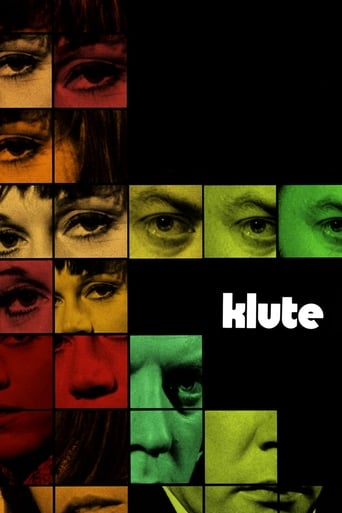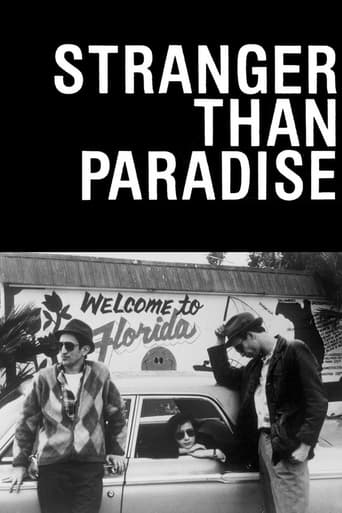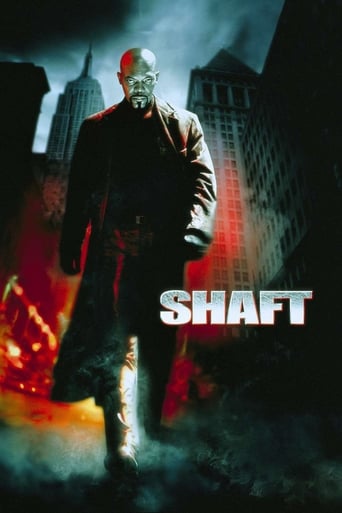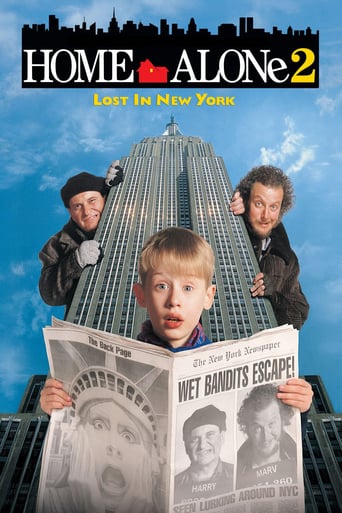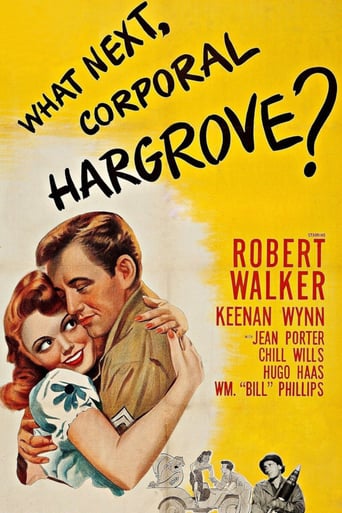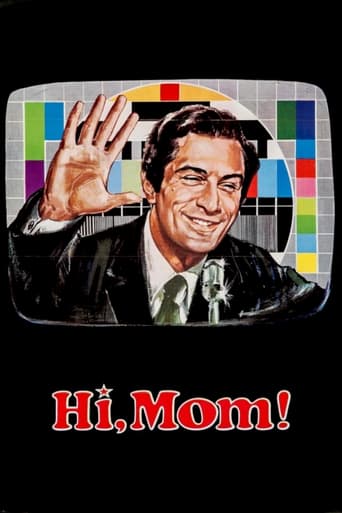
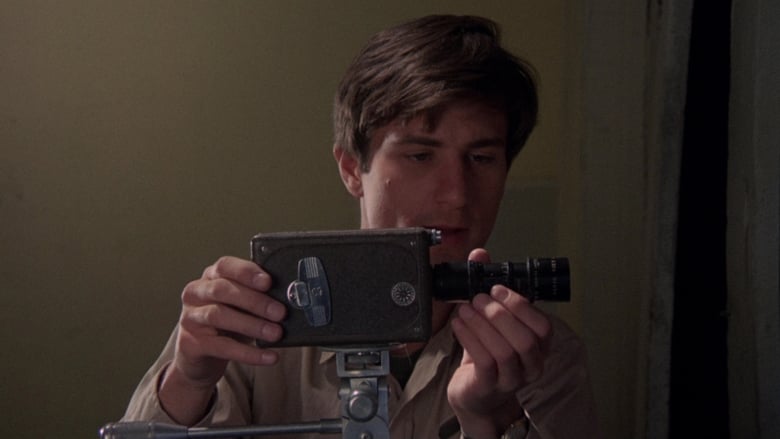
Hi, Mom! (1970)
Vietnam vet Jon Rubin returns to New York and rents a rundown flat in Greenwich Village. It is in this flat that he begins to film, 'Peeping Tom' style, the people in the apartment across the street. His obsession with making films leads him to fall in with a radical 'Black Power' group, which in turn leads him to carry out a bizarre act of urban terrorism.
Watch Trailer
Cast


Similar titles
Reviews
I think this is a new genre that they're all sort of working their way through it and haven't got all the kinks worked out yet but it's a genre that works for me.
hyped garbage
Clever, believable, and super fun to watch. It totally has replay value.
One of the worst ways to make a cult movie is to set out to make a cult movie.
I'm sure it all seemed like a good idea at the time.OK, it isn't bad. No, really. But it IS dated.DePalma's narrative has not improved over time actually. So it's a good thing his technique has. But fans of him or the future 'Taxi Driver' should see this on principle.You've got anti-racist rhetoric here. (Led by a young, bearded Gerrit Graham) Peeping tom and porno fantasies. And a seemingly confused Viet Nam vet. And this was 5 years BEFORE Travis Bickle.Sometimes it looked like this was 3 or 4 shorts blended into a film. The rawness is OK, but the haphazard timing can be infuriating at times.A continuation of 'Greetings' also by DePalma and with DeNiro. Give 'em some credit. They had to start somewhere.
Before any of his famous roles, Robert DeNiro starred here as Vietnam vet Jon Rubin, filming the activities of a black militant group in New York. In a way, "Hi, Mom!" almost seems like the sort of movie that they just made for fun (granted, it wasn't a big-budget studio movie). Still, something about a black militant group doesn't seem like the sort of thing that a person would do just for fun. A previous reviewer noted that this movie seemed like an homage to "Rear Window". Maybe so, given the voyeurism factor, but it seemed to me that it was mostly its own idea. All in all, a pretty interesting start for Brian DePalma.After this one, DePalma made some great movies early on ("The Phantom of the Paradise", "Carrie", "Dressed to Kill", "Blowout"). "Bonfire of the Vanities" and "Carlito's Way" were still good. With "Mission: Impossible", he was starting to get Hollywood, and "Snake Eyes" made it look like he had completely degenerated. I can only hope that "The Black Dahlia" is better.
In this very late 60's irreverent, almost anarchic low-budget film, Brian De Palma defines more of his strange, given Hitchcock-like fascination of voyeurism, and attacks the issues of the day. The most prominent of which, both cringe-inducing and just plain funny, is when he focuses on the black-power movement (a black woman handing out fliers asking white people 'do you know what it's like to be black'), which is something that could only work for that time and place, not before or now.But one of the key things to the interest in the film is 27 year old Robert De Niro (not his first or last film with the director), who plays this character who sits in a room looking out through his telescope at women in their rooms, setting up phony deals, and in the end basically throwing bombs. Those who have said that De Niro can't act and just is himself in every movie should see this movie, if only out of some minor curiosity. A couple of times in the film it's actually not funny, as when there's a disturbance in a black-power meeting (filmed in a grainer, rougher style than the rest of the film).In the end it's capped off with a rambling monologue in an interview that tops De Niro's in King of Comedy. It's pretty obvious where De Palma's career would go after this, into slightly more mainstream Hollywood territory, but all of his trademarks are here; the dark, almost nail-biting comedy, the perfectly timed style of voyeurism, and interesting usage of locals. Think if De Palma and De Niro did a Monty Python film, only even more low-budget and in its New York way just as off-the-hinges, and you got Hi, Mom! It also contains an eccentric and funny soundtrack.
Just rented and watched HI, MOM! and am blown away by parts of it which are so ahead of its time as to seem contemporary, given today's post-MTV-era approach to film-making. I would say 80% of this film is utterly brilliant and 20% is merely so-so; scenes with extended dialog sometimes have you checking your watch since the characters may seem to drone on about this-or-that, but there are enough funny moments in these sorts of scenes to keep your attention. And, believe me, you want to stay tuned for the "Be Black, Baby" portion of the film which is nothing short of side-splitting. The way the film is made, with its occasional fast-paced editing, sped-up footage, and other visual tricks (so dePalma) will appeal greatly to the short-attention-spans of today and seem to anticipate the way films will be made by mainstream producers and directors who cut their teeth creating music videos for MTV. I'm not saying this film feels like a music video, but it uses various visual devices which would become standard fare in music videos and part of today's cinematic vocabulary. Again, I can't reinforce how ahead of its time this film is, apparently foreshadowing things like "reality TV" in the "Be Black, Baby" guerrilla theatre piece.It's astounding and frightening to see how far we possibly HAVEN'T come past these notions of entertainment, or how they've become scarily mainstreamed by Hollywood. DeNiro gives a terrific performance and it's a real treat to see him doing something like this at a young age. Kudos to DePalma for this film, also -- it's a filmmaker's dream with all the film-within-film devices and you can see he's working out his fascination with optical and split-screen-type manipulations in a very youthful, bravura sort of way. I would say this is DePalma at his most innovative, aside from his shamefully underrated film SISTERS...before he became bloated and weighed down by the mainstream Hollywood ethic. That's not to say DRESSED TO KILL or CARRIE are bad pictures or bad reflections on DePalma, but they don't reflect the liberated genius that is clearly evident in HI, MOM! or SISTERS.HI, MOM! is an absolute MUST-SEE for any DePalma fan, general cineaste, film student, or comedy devotee. There are still lessons to be learned from watching this film, even today when it seems all the tricks DePalma used have been exploited ad infinitum. HI, MOM! manages to feel fresh in an era when -- by rights -- it really ought to feel stale. It's also a tremendously valuable look at pop culture from 1970 and contains some great moments in an adult movie theater. My favorite line occurs there, when a porno producer is counseling DeNiro (a would-be amateur porno producer himself, using his Super 8 mm camera). The two men sit in the back row, discussing the film they're watching and how it's made (and, for the uninitiated, this is typically where men-who-seek-the-company-of-other-men will congregate). Suddenly we have a rapid cut which shows another theater patron has sat himself next to the men, and the patron puts his hand on the leg of one of the men (DeNiro, I think, who brushes it off with some shock and embarrassment). The porno producer (mentor) says very sympathetically, regarding the gesture of the patron, "...he means well." Boy, ain't that the truth! Meanwhile, in the background, another patron is being thrown out of the men's room (presumably for having made a pass at someone homophobic).Another scene involves a pharmacist opening a condom package and demonstrating its strength and elasticity. Hilarious.These are issues you would likely never see addressed today in a mainstream Hollywood film because of America's prudishness, or they would be handled in a way that was purely condescending. Instead, DePalma takes you *into* the circumstances, humanizes them, and permits them to be funny on their own merit (he doesn't clobber you over the head with bad, smarmy, self-conscious jokes the way today's writers would).What is disappointing about this film is that it shows how DePalma's work ultimately suffered as he became a victim of the Hollywood machine -- the studios and execs who no doubt had a hand in reigning in his talent and vision, styling it for a perceived audience. Again, I can't recommend this film enough -- please rent it and see it and revel in its good-naturedness, it's incredibly edgy foreshadowing of things-to-come, and it's hilariously genuine humor.





